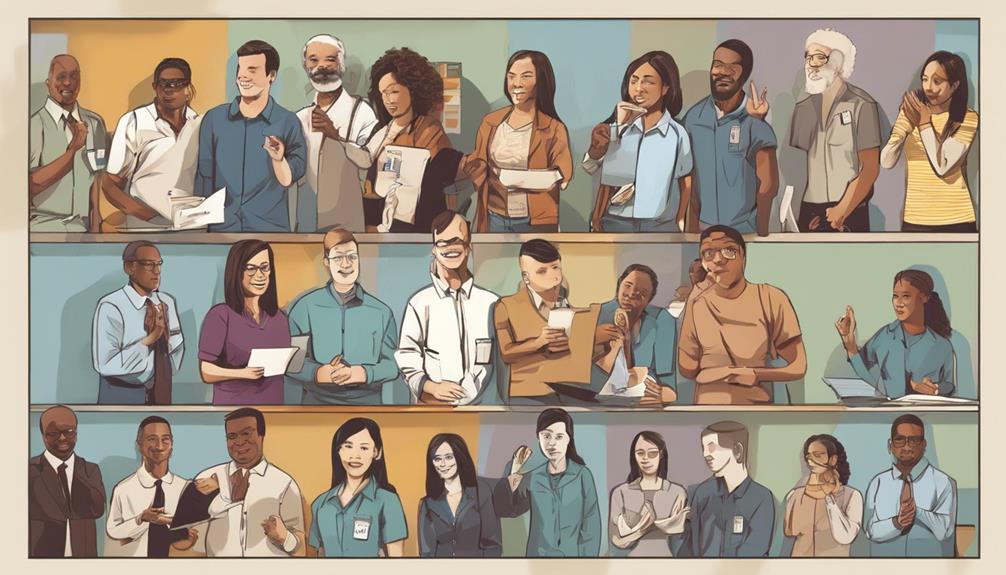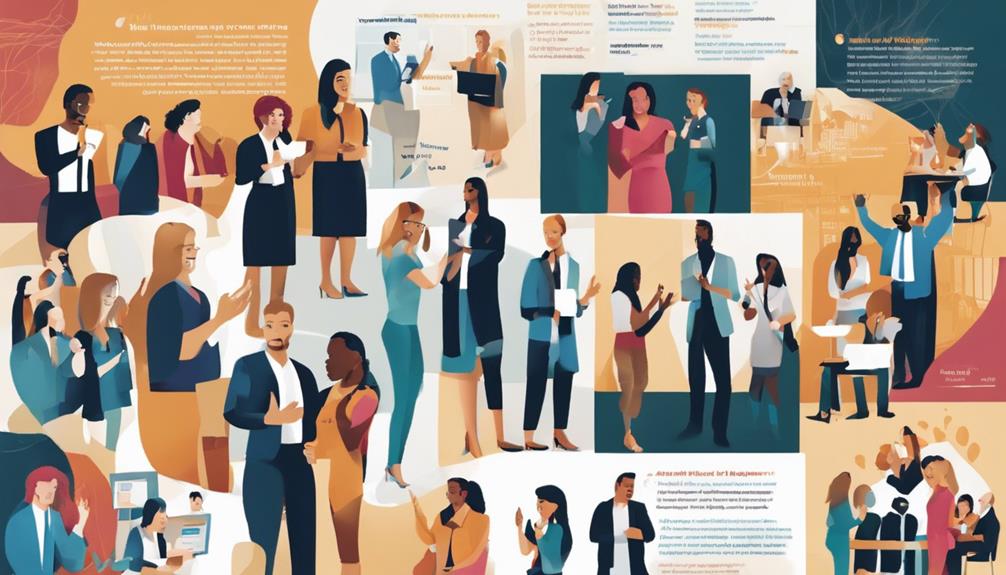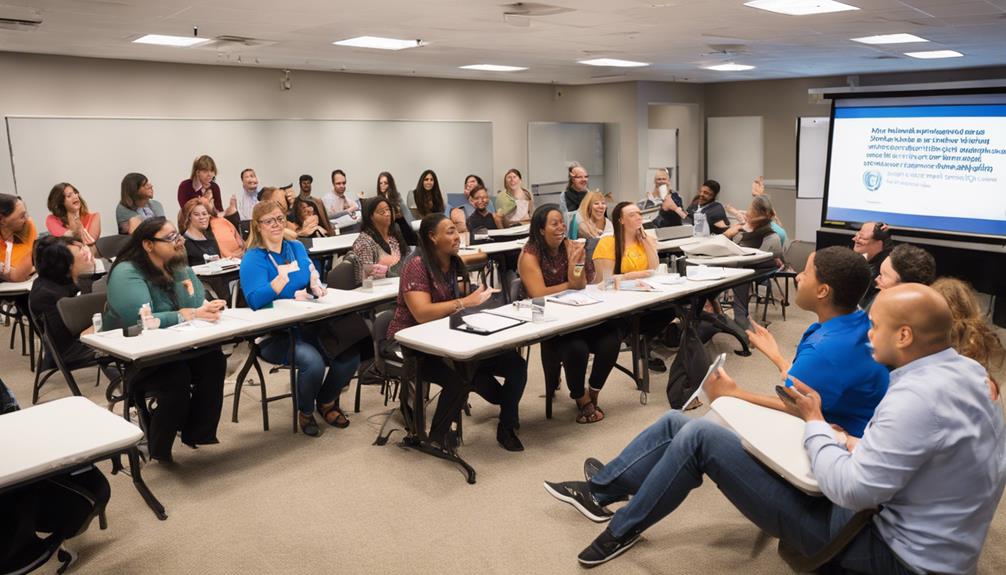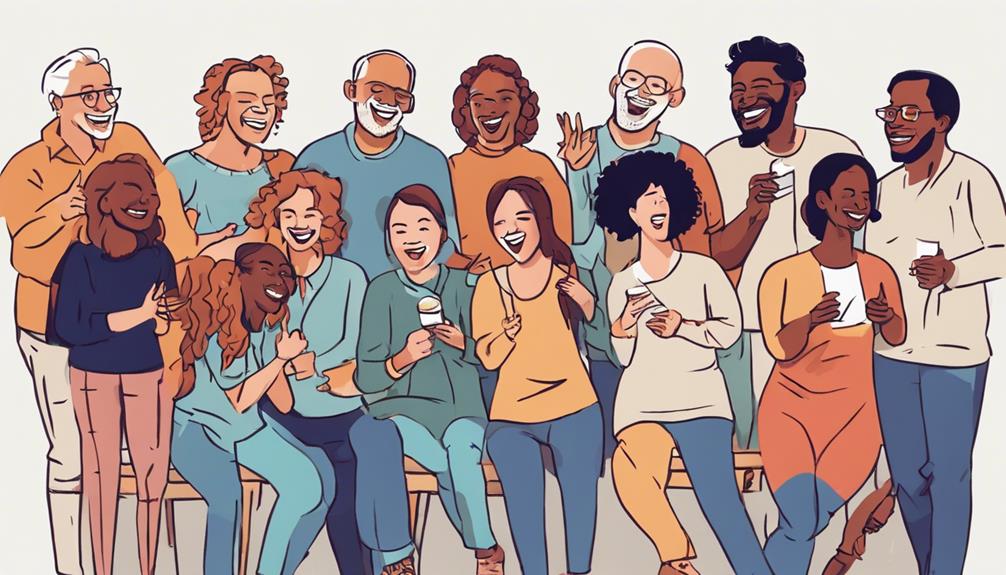When delving into the world of top Deaf Interpreter positions, one may be amazed by the wide range of opportunities available for talented individuals in this field.
From specialized roles requiring in-depth knowledge of sign language nuances to more general positions that cater to broader skill sets, the landscape of job prospects for Deaf Interpreters is both varied and intriguing.
The requirements for these positions differ significantly, underscoring the importance of understanding the unique demands and qualifications necessary to excel in this vital profession.
Key Takeaways
- Deaf Interpreters require certification like CDI or SC:L for specialized jobs.
- Proficiency in sign and spoken language, cultural understanding, and ethical conduct are vital.
- Job opportunities in healthcare, education, and legal settings are expanding for Deaf Interpreters.
- Technology tools like video relay services enhance communication access and job outlook for Deaf Interpreters.
Job Opportunities for Deaf Interpreters
If you're a skilled Deaf interpreter seeking job opportunities, several positions are currently available in various locations across different sectors.
At Leeds and York Partnership NHS Foundation Trust, a Specialist Deaf Outreach Worker position awaits, focusing on aiding the Deaf community within healthcare settings.
Sign Solutions presents RSLI/TSLI BSL Interpreter roles in Devon, Bristol, and Surrey/Frimley NHS Trust, offering diverse experiences in the field. For those interested in freelance work, Sign Solutions in Redditch has openings for RSLI BSL Video Interpreters, providing flexibility and autonomy in schedule management.
In the education sector, the Irving Independent School District seeks Deaf Education Communication Facilitators to support Deaf students in their academic journey. Similarly, Talbot County Public Schools have a Sign Language Interpreter position available, ensuring effective communication for Deaf students within the educational environment.
These opportunities showcase the demand for Deaf interpreters across various industries, highlighting the importance of bridging communication gaps for the Deaf community.
Educational Requirements for Deaf Interpreters

Educational requirements for Deaf interpreters typically include a bachelor's degree in interpretation, deaf studies, or a related field. Employers may also require certification, such as RID certification for sign language interpreters. Specialized training in deaf culture, linguistics, and interpretation techniques is crucial for Deaf interpreters to excel in their roles. Proficiency in both sign language and spoken language is essential for effective communication facilitation. To help you visualize the educational journey of a Deaf interpreter, here is a breakdown of the typical educational requirements:
| Education | Description | Importance |
|---|---|---|
| Bachelor's Degree | Interpretation, Deaf Studies, or Related Field | Fundamental |
| Certification | RID Certification or Equivalent | Often Required |
| Deaf Culture | Specialized Training | Essential |
| Linguistics | Understanding Language Structure | Key Aspect |
| Interpretation Techniques | Skills Development | Critical |
Understanding these educational pillars can help you embark on a successful career as a Deaf interpreter.
Certification Options for Deaf Interpreters
When it comes to certification options for deaf interpreters, understanding the different levels of certification and specialized training programs is key.
These aspects play a crucial role in shaping the skills and expertise of deaf interpreters, enabling them to meet the diverse communication needs of deaf individuals effectively.
Certification Levels Explained
Exploring certification options for Deaf Interpreters reveals the diverse pathways available to showcase their advanced skills in various specialized fields. When considering certification levels for Deaf Interpreters, two prominent options stand out:
- Certified Deaf Interpreter (CDI): Designed for Deaf individuals who interpret professionally, demonstrating advanced skills in both ASL and English.
- SC:L Certification (Specialist Certificate: Legal): Focuses on legal interpreting skills, ensuring proficiency in legal terminology and procedures.
Both certifications require extensive training, testing, and adherence to a professional code of conduct. Achieving these certifications can significantly enhance job opportunities and credibility for Deaf Interpreters in specialized fields. These certifications not only validate skills but also open doors to a wider range of professional opportunities.
Specialized Training Programs
To further enhance our skills and expertise, Deaf Interpreters often seek specialized training programs that offer certification options tailored to our unique needs and goals. These programs focus on cultural competency, linguistic fluency, and ethical considerations specific to the Deaf community.
Certification options may include coursework in deaf culture, ASL linguistics, and interpreting techniques. Some programs mandate a minimum number of supervised interpreting hours to ensure practical experience and skill development.
Becoming certified as a deaf interpreter showcases proficiency in bridging communication gaps between deaf and hearing individuals across various settings. The goal of these specialized training programs is to equip us with the necessary knowledge and expertise to facilitate effective communication for all parties involved.
Specialized Settings for Deaf Interpreters

In specialized settings, Deaf Interpreters play a crucial role in facilitating effective communication between Deaf individuals and service providers, ensuring accuracy and cultural sensitivity. These settings encompass a diverse range of environments where Deaf Interpreters are essential for bridging communication gaps.
Some of these specialized settings include:
- Healthcare Facilities: Deaf Interpreters assist in medical appointments, ensuring Deaf patients fully understand their diagnosis, treatment plans, and any medical jargon used.
- Educational Institutions: Deaf Interpreters support Deaf students in classrooms, ensuring they have equal access to education and fostering a conducive learning environment.
- Legal Settings: Deaf Interpreters play a critical role in legal proceedings, ensuring that Deaf individuals comprehend their rights, obligations, and the legal processes they are involved in.
Working in specialized settings demands a deep understanding of Deaf culture, linguistic nuances, and the specific needs of the Deaf community being served. Deaf Interpreters in these settings often undergo additional training to master the complex terminology and dynamics unique to each field.
Skills and Qualities Needed for Deaf Interpreters

Deaf Interpreters must possess a combination of fluency in sign language, strong communication skills, and cultural competency to effectively bridge communication gaps in specialized settings. Fluency in sign language goes beyond just knowing the signs; it includes understanding regional variations and cultural nuances to ensure accurate interpretation. Strong communication skills are vital for conveying messages between deaf and hearing individuals accurately and effectively. Additionally, excellent listening skills are crucial for comprehending spoken language and translating it into sign language seamlessly. Cultural competency plays a significant role in understanding the diverse backgrounds and experiences of the deaf individuals they work with. Many deaf interpreters undergo specialized training and certification to enhance their skills and proficiency in interpreting across various settings.
| Skills and Qualities | Description |
|---|---|
| Sign Language | Fluency in sign language, including regional variations and cultural nuances |
| Communication Skills | Strong ability to convey messages accurately between deaf and hearing individuals |
| Cultural Competency | Understanding diverse backgrounds and experiences of deaf individuals |
| Specialized Training | Undergoing training and certification to ensure proficiency in different settings |
Technology Tools for Deaf Interpreters

As deaf interpreters, we rely on a range of technology tools to enhance our communication services. From video relay services to text-to-ASL apps, these advancements play a crucial role in facilitating effective interpretation.
Sign language apps like ProDeaf Translator and video call software such as Glide and FaceTime are just a few examples of the tools we utilize daily.
Interpreter Tech Advancements
With the rapid advancements in technology tools tailored for interpreters serving the deaf community, our ability to provide efficient and accessible communication support has reached new heights. These advancements include:
- Video relay services (VRS) have revolutionized remote interpreting, offering immediate access to interpreters via video calls.
- Tablets and smartphones with specialized apps enable deaf interpreters to provide services on-the-go and in various settings.
- Real-time captioning and speech-to-text technology support interpreters in live events and conferences, ensuring accessibility for all participants.
These developments have significantly enhanced the quality and reach of interpreter services, making communication more inclusive and effective for the deaf and hard of hearing community.
Sign Language Apps
Sign language apps have revolutionized the way deaf interpreters enhance their signing skills and vocabulary, offering interactive learning experiences and convenient practice opportunities. These apps, such as 'ASL American Sign Language' and 'ProDeaf Translator,' feature video demonstrations, quizzes, and vocabulary lists to improve sign language comprehension.
Users can practice fingerspelling, learn common phrases, and enhance their signing abilities on-the-go. Sign language apps not only sharpen skills but also provide a platform for connecting with a community of sign language learners and practitioners for additional support.
For deaf interpreters looking to expand their American Sign Language (ASL) knowledge and proficiency, these apps offer a modern and engaging way to further their learning journey.
Job Outlook for Deaf Interpreters

The job prospects for Deaf Interpreters are on the rise due to the increasing demand for their specialized skills across various sectors. Deaf Interpreters play a crucial role in ensuring communication access for Deaf individuals in educational, healthcare, legal, and community settings. The job outlook for Deaf Interpreters is promising, with employment opportunities expanding as organizations recognize the importance of inclusive services for Deaf and hard of hearing individuals.
Organizations are increasingly valuing the unique skills that Deaf Interpreters bring to the table.
Legal mandates and awareness of accessibility rights are driving the demand for Deaf Interpreters.
Collaborating with Hearing Interpreters, Deaf Interpreters help guarantee accurate and culturally appropriate communication access for all parties involved.
As the need for effective communication across diverse populations grows, the role of Deaf Interpreters becomes even more vital in bridging the gap and fostering understanding between Deaf and hearing individuals.
Networking Opportunities for Deaf Interpreters

Exploring various networking avenues can significantly enhance the professional growth and connections of Deaf interpreters in the field. Engaging in networking opportunities not only fosters collaboration but also opens doors to new possibilities within the Deaf community. Here are some effective ways for Deaf interpreters to expand their network:
| Networking Avenue | Description | Benefits |
|---|---|---|
| Joining professional organizations like RID | Connect with fellow interpreters and access resources for professional development. | Stay updated on industry trends and job opportunities. |
| Attending Deaf interpreting conferences and workshops | Meet experts in the field, learn new skills, and establish meaningful professional contacts. | Enhance knowledge and build a strong support system. |
| Engaging in online platforms like LinkedIn | Showcase skills and expertise, connect with potential clients, and stay connected globally. | Expand reach and visibility in the Deaf interpreting community. |
| Collaborating with Deaf organizations and community centers | Build relationships with key stakeholders and contribute to the Deaf community. | Gain insights into community needs and potential job leads. |
Professional Development for Deaf Interpreters

Engaging in ongoing professional development opportunities is crucial for Deaf interpreters to continually enhance their skills and stay current in the field. As Deaf interpreters, we understand the importance of honing our craft through various avenues. Here are three key ways professional development can benefit us:
- Workshops: Attending workshops tailored to Deaf interpreters can provide valuable insights, techniques, and updates on industry standards.
- Specialized Training Programs: Enrolling in specialized training programs focusing on legal interpreting, medical interpreting, or educational interpreting can help us develop expertise in specific areas, catering to diverse interpreting needs.
- Continuing Education: Taking part in mentorship programs, online courses, and certification programs allows us to stay abreast of the latest best practices and maintain our professional edge.
Frequently Asked Questions
Where Are ASL Interpreters Needed Most?
In educational settings, such as schools and universities, ASL interpreters are essential for deaf students to access information.
Healthcare facilities, like hospitals and clinics, rely on ASL interpreters to facilitate communication between healthcare providers and deaf patients.
Legal settings, such as courtrooms and law offices, often require ASL interpreters to aid deaf individuals in understanding legal proceedings.
Government agencies and public services also need ASL interpreters to provide access to information and services for the deaf community.
What Type of ASL Interpreter Makes the Most Money?
We've found that Certified Deaf Interpreters (CDIs) often earn the highest salaries in the field. Their specialized skills, especially with Deaf individuals who've limited language proficiency, can command higher rates, especially in complex or sensitive situations.
CDIs with certifications from organizations like RID or BEI can negotiate better pay based on their experience. Those in specialized areas like legal or medical interpreting tend to have the highest earning potential due to demand.
What Do You Need to Be an ASL Interpreter?
To be an ASL interpreter, we need a bachelor's degree in ASL interpretation or a related field. Demonstrating fluency in American Sign Language (ASL) and English is crucial, as is obtaining certification, often from the Registry of Interpreters for the Deaf (RID).
Strong interpersonal skills are a must to effectively facilitate communication between deaf and hearing individuals. Continuous professional development and training are essential for us to maintain and improve our skills.
How Much Do ASL Interpreters Make in Fl?
In Florida, ASL interpreters can make an average annual salary of $50,000 to $60,000. Salaries vary based on experience, certifications, and employers.
Freelancers often earn higher rates per assignment compared to staff interpreters. Educational, healthcare, and legal settings may offer different pay scales.
Demand, location within Florida, and specialization also impact earning potential. These factors influence the range of incomes for ASL interpreters in the state.
What Skills and Qualifications are Needed for Deaf Interpreter Jobs?
The skills and qualifications needed for deaf interpreter jobs include fluency in sign language, cultural competency, and a certification from the Registry of Interpreters for the Deaf. In addition, familiarity with the best deaf transcription tools is essential for accurate communication and seamless interpretation services.
Conclusion
In conclusion, the world of deaf interpreter jobs offers a vast array of opportunities for individuals skilled in sign language. The possibilities are endless, with roles ranging from educational settings to healthcare environments.
With the right training, certification, and passion for communication, deaf interpreters can make a significant impact in the deaf community. So, don't miss out on the chance to dive into this exciting and fulfilling career path – the sky's the limit!










